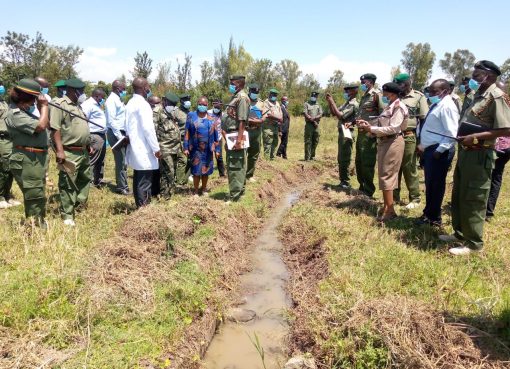The Kenya Private Sector Alliance (KEPSA), in partnership with Twiva, has announced a new project dubbed the Twende Digital Project.
The project is being funded by the Challenge Fund for Youth Employment (CFYE) to oversee the creation of work opportunities for young digital content creators while supporting SMEs in adopting the use of technology through intensive capacity building and technical assistance on the use of digital skills and platforms, which will eventually help these businesses to scale up.
This project primarily focuses on addressing the critical issue of youth unemployment in Kenya, where recent statistics by the Kenya National Bureau of Statistics indicated that over 50 per cent of the 2.97 million jobless Kenyans are between the ages of 18 to 29.
“A great lesson we have drawn from executing employment projects in Kenya is the fact that meaningful youth participation is a key factor in attracting and retaining youth in employment,” said Paul Ngugi, Deputy Country Lead of the Challenge Fund for Youth Employment.
Ngugi said that the Challenge Fund for Youth Employment plans to create 230,000 jobs for young people in Africa by 2026.
“These jobs should be dignified and fulfilling work as per the African strategy of good jobs and good salaries. We have also learned that it is very crucial to support the private sector, especially in measuring the impact of youth employment initiatives. This is why digitising SMEs will not only help expand these businesses but also ensure the creation of jobs,” said Ngugi.
The Twende Digital Project is guided by the CFYE’s goal of fostering youth employment initiatives in Africa. Hence, the project will provide significant work opportunities to both rural and urban setups in the country, such as Nairobi, Nakuru, Kisumu, Mombasa, Eldoret, Nyeri, Machakos, Kiambu, Garissa, and Kakamega.
The selected businesses will enjoy digitization services and tools for free for the next 12 months, including influencer marketing service credits, content creation credits, access to business digital coaches, access to influencers or resellers to help resell the SMEs’ goods, linkage to logistics and fulfilment partners, digital marketing training, and digital marketing advisory services.
The absence of sufficient employment opportunities has been a huge hurdle in Kenya, especially where recent reports have shown that over 2.97 million Kenyans are jobless. Out of these numbers, 50% are between the ages of 18 years to 29 years.
“Enterprises stand to have a great chance of unlocking the wealth of opportunities and building a global competitive advantage through adoption and prioritising digitization,” said Dr. Ehud Gachugu, Director of Youth and Jobs at the KEPSA.
Dr. Gachuga said that as the benefits of digitization become clearer for businesses, they stand to benefit from access to wider markets, more efficient processes, increased productivity, better stock management, and reduced costs; hence, the adoption of digitization cannot be ignored.
“Besides providing solutions for the growth of these businesses, digitization has brought about new and more exciting work opportunities for the young people in Kenya,” he said.
“As a social commerce platform that gives micro, small, and medium enterprises digital access to markets through content creators, Twiva will play a pivotal role in supplying experienced social media influencers and resellers as well as the social commerce platforms to market and resell goods and services on behalf of these SMEs,” he added.
This will then see the creation of work opportunities for the influencers while at the same time boosting the productivity of the SMEs through the integration of digital technologies.
“The anticipated impact of the TwendeDigital project is not just a statistic; it is a transformation. As we aim to elevate the average income of employed youth from less than Sh10,000 to approximately Sh25,000, the project becomes a catalyst for change, injecting vitality into the lives of young individuals. Job satisfaction rates among the youth are not merely a metric; they represent a shift in the narrative of what it means to find meaningful work,” said Peter Kironji, CEO and co-founder of Twiva.
Addressing challenges and fostering inclusivity, the project allocates 60% of opportunities to women-led SMEs and focuses on building digital skills among SMEs.
At the same time, through the indirect work opportunities that are digitally enabled, the project will provide start-up opportunities for youth without formal experience or capital, especially in areas of logistics and shipping of products to clients.
Also expressing his insights and expectations about such opportunities for digital content creators, Philip Karanja, the CEO of PhilItTV, explained that it is important for businesses to look for an influencer that they can connect with and that can help elevate their business to the next level.
He said that branding requires a 360-degree approach, from images and logos to the customer experience. He challenged the businesses present at the forum to involve influencers who can ensure improved visibility for their potential clients while they concentrate on other core functions of the business.
“Looking beyond the immediate impact, the sustainability of the Twende Digital Project is rooted in its holistic approach. By empowering youth and women economically, we envision a ripple effect that contributes to the growth of the economy and poverty reduction. This is a commitment to building a sustainable future,” continued Dr. Gachuga.
By Joseph Ng’ang’a





